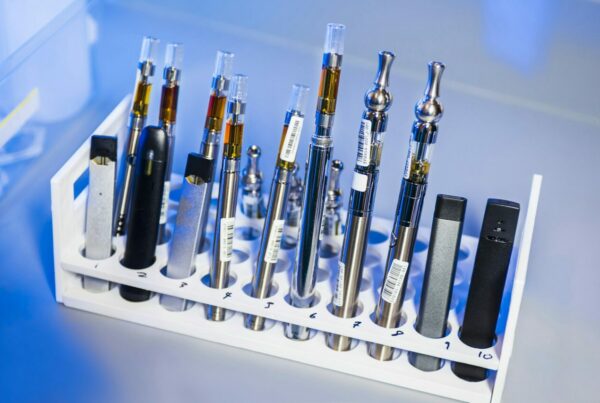N, N-Dimethyltryptamine (DMT) is a chemical compound naturally occurring in various plants and animals. It is known for its potent yet short-lived psychedelic effects when ingested.
Emerging evidence indicates that DMT, being naturally present in the body, may play crucial roles in our peripheral and central nervous systems, possibly acting as a neurotransmitter.
DMT can trigger intense psychedelic experiences, but it usually doesn’t result in many negative effects. However, potential cardiovascular problems may arise if high doses are injected.
Let’s explore DMT and its diverse functions, ranging from recreational use to its promising potential in scientific studies and therapeutic uses.

A Brief Introduction to DMT: What is it?
| Aspect | Details |
| Name | N, N-Dimethyltryptamine (DMT) |
| Classification | Indole alkaloid |
| Occurrence | Naturally found in a variety of plants and animals |
| Psychoactive Effects | Produces brief, potent psychedelic experiences upon ingestion. |
| Method of Consumption | Can be smoked, injected, or orally taken. |
| Duration of Effects | Short duration, typically lasting from 5 to 30 minutes. |
| Chemical Structure | Comprises a tryptamine core with two methyl groups attached to the amine nitrogen atom. |
| Metabolism | Rapidly metabolized by the body, broken down by monoamine oxidase (MAO). |
| Cultural Use | Has been used in various ceremonial and shamanic rituals by indigenous cultures historically. |
| Other names | Dimitrifantasiabusinessman’s tripBusinessman’s special45-minute psychosisspiritual molecule |
The Role of DMT in Mental Health
N, N-Dimethyltryptamine (DMT), a compound famous for its powerful psychedelic impacts, is gaining attention for its potential benefits to mental health. Despite its conventional image of inducing profound visionary experiences, recent research suggests a correlation between DMT and mental wellness.
Influence on Psychological and Emotional Well-being
DMT’s psychedelic effects are known to elicit profound emotional experiences and alter states of consciousness. These effects could potentially pave the way for new therapeutic approaches to manage mental health issues, assist in emotional processing, and offer new perspectives on personal traumas.
Neuroplasticity and Brain Function
Research suggests that DMT may influence neuroplasticity, thereby enhancing the brain’s ability to adapt and reorganize. Investigating its impact on synaptic plasticity and neural connectivity could provide potential treatments for disorders associated with neural maladjustment.
Potential Therapeutic Use for Mental Health Disorders
Initial research underlines the potential of DMT in treating disorders such as depression, addiction, and PTSD. Its ability to induce spiritual or mystical experiences could propose a novel method for psychotherapy and help in restructuring negative thought patterns.
Studies into the natural presence of DMT within the human body suggest its significance in promoting mental health resilience, managing stress responses, and maintaining overall psychological well-being. Understanding how the body regulates its internal DMT levels could lead to the development of new therapeutic strategies.
DMT and Mental Health Disorders
| Mental Health Disorder | Description | Effectiveness of DMT | Advantages |
| Depression | A mood disorder characterized by enduring sadness, disinterest, and decreased motivation | Initial research suggests that DMT may mitigate symptoms by inducing profound emotional experiences. | DMT’s rapid onset and ability to trigger transformative experiences could provide innovative therapeutic approaches for modifying negative thought patterns and improving emotional processing |
| Post-Traumatic Stress Disorder (PTSD) | A mental health condition triggered by traumatic events resulting in flashbacks, extreme anxiety, and intrusive thoughts | Preliminary research indicates the potential of DMT to manage symptoms by inducing spiritual or mystical experiences that may help patients reshape traumatic memories | DMT’s potential to induce altered states of consciousness may facilitate emotional processing and offer a fresh perspective on traumatic experiences |
| Addiction | A complex disorder characterized by compulsive participation in rewarding stimuli despite adverse consequences | Certain studies suggest DMT’s potential in disrupting addictive behaviors and reducing substance cravings | DMT’s capacity to trigger profound and transformative experiences could assist individuals in modifying their behavior patterns and addressing underlying causes of their dependency |
Approach to Utilizing DMT
DMT, renowned for triggering short but potent psychedelic episodes, can be consumed in various ways. The chosen method often depends on the desired intensity and duration of the experience.
Smoking:
When DMT is smoked in a pipe or vaporizer, it is crucial to control the temperature to avoid overheating and burning the substance. DMT induces an almost instant psychedelic journey when smoked, usually lasting between 5 to 15 minutes.
Oral Intake:
Consuming DMT orally triggers slower-acting effects that can last for several hours. This prolonged effect is due to the slower decomposition of DMT when combined with an MAOI.
Injection:
Injecting DMT directly into the bloodstream leads to quick and potent effects.
This method produces an immediate and intense experience, but it necessitates precise dosing and carries greater risks.
Insufflation (Snorting):
Snorting DMT results in a slower onset compared to smoking, but it might provide a longer-lasting journey.
Sublingual or Buccal Administration:
By absorbing DMT through the oral mucosa, this method provides an alternative to smoking and yields a longer, though less intense, journey.
Determining Therapeutic Dosage: N, N-Dimethyltryptamine (DMT)
For smoking, the recommended dosage is between 20 to 40 mg, while for intravenous use, the suggested dosage is 0.2 to 0.4 mg per kg of body weight. These dosage recommendations are primarily intended for clinical research and are particularly pertinent for intravenous administration.
- Higher doses administered intravenously are associated with intense visuals, temporary loss of control, and a combined state of anxiety and euphoria
- Interestingly, lower doses have produced less favorable effects
- Recreational doses of smoked DMT usually range from 40 to 50 mg, occasionally even peaking at 100 mg
- Different doses of intravenous People who have experienced near-death scenarios associated with DMT (7, 14, 18, and 20 mg solutions) have reported positive and lasting improvements in their psychological health.
Availability of DMT
ProductsOsmosis – 4-ACO-DMT Ethereal Essence Tincture
This tincture is marketed as containing 4-Acetoxy-N, N-dimethyltryptamine (4-AcO-DMT), a variant of DMT. Tinctures are liquid extracts designed for oral use, and this particular product could offer a distinct experience compared to traditional DMT.
Lucid Supply Co. – 5-MeO DMT Vaporizer
This product is a vaporizer that dispenses 5-Methoxy-N, N-dimethyltryptamine (5-MeO-DMT). The active ingredient, 5-MeO-DMT, is renowned for its potent, transformational, and often short-lived experiences.
Integral Alchemist – Acacia – 1ml DMT Vape Cartridge
The Integral Alchemist’s DMT vape cartridge is pre-filled with N, N-Dimethyltryptamine. This product is likely aimed at those who prefer a discreet and convenient method of DMT ingestion.
Deadhead Chemist – 5-Meo-DMT Cartridge
This cartridge contains 5-Methoxy-N, N-dimethyltryptamine (5-MeO-DMT), a substance known for its deep and intense effects.
Potential benefits to mental health may be linked to personal growth, spiritual experiences, or therapeutic applications aimed at enhancing emotional well-being.
Deadhead Chemist – N, N DMT Cartridge
Another offering from Deadhead Chemist, this cartridge holds the traditional N, N-Dimethyltryptamine. Cartridges provide a user-friendly method of DMT intake, allowing for a more controlled and consistent experience.
Concluding Remarks
The consumption of N, N-Dimethyltryptamine (DMT) in
What is the recommended method for using DMT for mental health?
It’s essential to make well-informed decisions, which includes doing thorough research and understanding the compound’s effects.
Seeking advice from mental health professionals or experienced users can provide valuable insights into potential risks and rewards.
Determining personal tolerance and mental preparedness is also crucial, along with ensuring a supportive and secure environment for the experience.
How does DMT stack up against other psychedelic therapies like psilocybin or LSD in the field of mental health treatment?
DMT’s effects, duration, and intensity vary from other psychedelics such as psilocybin or LSD, particularly due to its brief duration.
High-intensity, short-acting psychedelics like DMT offer unique experiences that require particular therapeutic methods in mental health care, different from those implemented for longer-lasting psychedelics.
Recommended Further Reading:





